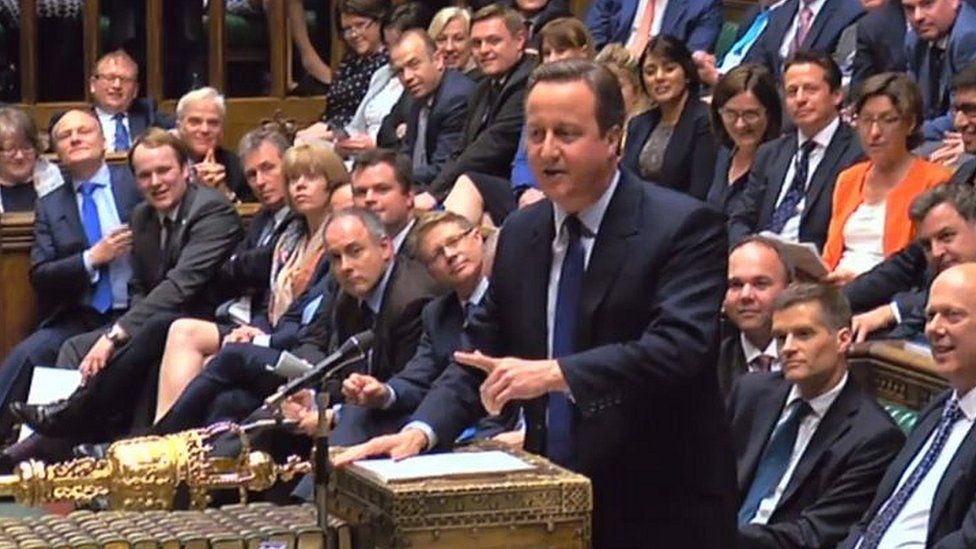David Cameron moves to head off TTIP rebellion
- Published

Downing Street has headed off a revolt over the Queen's Speech by saying it will accept a move to exclude the NHS from a controversial EU-US trade deal.
Tory rebels were threatening to join Labour and the SNP to back an amendment "regretting" the lack of a bill to protect the NHS from the TTIP deal.
But Downing Street has denied them the chance by saying they will back it.
One of the MPs tabling the amendment, Labour's Paula Sherriff, described it as a "humiliating climbdown" by the PM.
"They will now be the first government in history to officially 'regret' their own programme within days of announcing it, just months after doing the same on their Budget," she said.
Conservative MP and Leave campaigner Steve Baker MP said: "The government has today admitted that the EU is a threat to our NHS. The only way we can protect the NHS from TTIP is if we Vote Leave on 23 June."
But a spokesman for Number 10 said: "As we've said all along, there is no threat to the NHS from TTIP. So if this amendment is selected, we'll accept it."
'Tory psycho-drama'
Also on Thursday, David Cameron told LBC radio he did not want the EU referendum to become a "Tory psycho-drama" involving him and senior "Leave" Conservatives Boris Johnson and Michael Gove but claimed former London mayor Mr Johnson had "told a lot of people that he'd never been a leaver". He also described himself as a Eurosceptic but said he believed it was better that the UK remain in the EU.
Mr Johnson, in response, said he had been a "Eurosceptic for decades" and said: "I urge my friends in government to recognise that in all logic, and as self-declared Eurosceptics, they should really be campaigning with us on this side of the argument."
The TTIP amendment - signed by 25 Tory MPs - expressed regret that the government has not brought forward a bill to protect the NHS from the Transatlantic Trade and Investment Partnership (TTIP) deal, currently being negotiated between the EU and the US.
Although it would have been a purely symbolic vote, no government has suffered a defeat on a Queen's Speech, which sets out its legislative programme for the year ahead, since 1924.
Labour leader Jeremy Corbyn, who has long opposed TTIP, had said he would back the Conservative rebels.
It is understood the SNP and other minority parties were also likely to support the amendment.
'Completely protected'
Sources in the Vote Leave campaign predicted the government had faced defeat unless it backed down.
Conservative former minister Peter Lilley, who supported the amendment, said that although he supports free trade, TTIP would introduce "special courts which are not necessary for free trade, will give American multinationals the right to sue our government (but not vice versa) and could put our NHS at risk".
What is TTIP?
TTIP is primarily a deal to cut tariffs and regulatory barriers to trade between the US and EU countries, making it potentially easier for companies on both sides of the Atlantic to access each other's markets.
Industries it would affect include pharmaceuticals, cars, energy, finance, chemicals, clothing and food and drink.
The government says shoppers would benefit by the removal of EU import tariffs on popular goods, such as jeans and cars.
In the UK, attention has focused on the potential impact on the NHS, with critics saying TTIP would allow private firms running NHS services to sue the government if it chose to return the services to the public sector.
Labour MP Frank Field, who backed the amendment, said: "We can't have kangaroo courts, operating only to America's advantage, deciding how we should trade in respect of the NHS."
SNP MP Tasmina Ahmed-Sheikh said: "The SNP have been at the forefront of the campaign to protect the NHS and other public services from the potential consequences of TTIP, and so we welcome any opportunity to ensure that the Tory government keep the promises they have already made."
But former Labour minister Rachel Reeves, writing on the Labour List website, said: "Those who want Britain to leave the EU need to stop preying on British peoples' love for the NHS by cynically pretending that TTIP poses a threat. It does not.
"They are demeaning their own campaign by arguing a case they know to be untrue."
'TTIPs on steroids'
But Green Party MP Caroline Lucas, who like Ms Reeves is backing the Remain campaign, said she would vote for the amendment.
She said: "If we left the EU, then we could be left with the government negotiating trade deals with the rest of the world. What then?
"With the Tories still in charge, we could then expect the roll out of multiple TTIPs on steroids as Britain negotiated trade deals with countries across the world."
- Subscribe to the BBC News EU referendum email newsletter and get a weekly round-up of news, features and analysis on the campaign sent straight to your inbox.